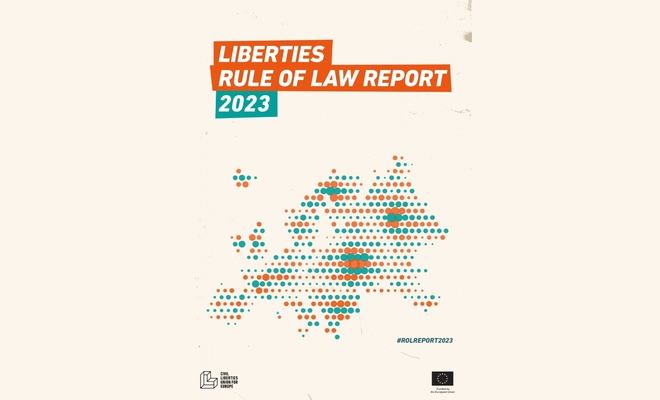Governments continue weakening democracy in 2022, EU-wide annual rule of law report by 45 civil liberties groups finds

Most EU countries made little effort to resolve documented rule of law issues, allowed existing shortcomings to go unaddressed, or even made things worse in all areas assessed, ‘Liberties Rule of Law Report 2023’ (Report) finds. Exceeding the scope of the European Commission’s annual rule of law audit, Liberties’ Report lays out the most striking developments concerning justice, corruption, media freedom, checks and balances, civic space and systemic human rights issues in 2022 as compiled by 45 human rights organizations in 18 countries across the EU. The Report is the most in-depth ‘shadow report’ exercise to date on the rule of law by an independent civil liberties network in the EU.
In Croatia inefficiency of the judiciary, attacks and SLAPPS against journalists, continuing trend of shrinking civic space and wide-spread violations against refugees and other migrants are among the top rule of law issues, according to the Centre for Peace Studies contributing to the EU-wide report.
Sara Lalić, Programme Director of the Centre for Peace Studies, said:“Rule of law in Croatia has not been enhanced in 2022. We are particularly concerned about the SLAPPs against journalists, shrinking civic space issues and impunity for systematic violations of human right of refugees and other migrants by the Croatian police."
Balazs Denes, Executive Director of the Civil Liberties Union for Europe (Liberties), said: “European governments should realize that by failing to nurture their democracies, they pave the way for extremist politicians who will not hesitate to tear down the whole system. Despite Brussels having allowed itself to be blackmailed into taking half measures, we want to see the EU make full use of the conditionality mechanism for both the Polish and Hungarian regimes. When funds are suspended, it must be at a level that gives Orban and Kaczynski no choice but to return democracy to their citizens, because Poland and Hungary need the EU to cope with the fallout of Russia’s war in Ukraine.”
KEY FINDINGS FROM ACROSS THE EU (SEE TOPICAL TRENDS BELOW)
- ‘OUTLIERS’: HUNGARY and POLAND remain the worst offenders on the rule of law. Although the EU has triggered its newly created conditionality mechanism to withhold funds from Hungary, this has yet to produce genuine improvements on the ground. And similarly, the reforms being negotiated with Poland in exchange for release of EU COVID Recovery funds would lead to only modest improvements that don’t free judges from political control. These governments continue to implement a series of measures designed to centralize power, silence their opponents, control public opinion, and make it very difficult to lose future elections.
- ‘FAST LEARNERS’: ITALY, SWEDEN. Early signs from the new governments formed in Italy and Sweden in 2022 point to the risk that, if checks and balances do not stay strong, ruling coalitions may turn towards authoritarianism. For example, we have already seen a sharp increase in rhetorical attacks against NGOs and the media by both of these new governments. However, these countries have strong independent institutions, which, in the short-term, prevent a turn to authoritarianism on the scale of Hungary and Poland.
- RECOVERING SLOVENIA. In contrast, developments in Slovenia since the replacement of the far-right government show that countries can rehabilitate their democracies. For example, the Report records efforts to restore independence to institutions like the public broadcaster and to revoke and reimburse fines that were illegally issued under the previous far-right government to citizens for attending protests.
- MIXED RESULTS: THE EU. While the situation across the member states continues in the wrong direction, the EU has had mixed success in exerting a positive influence. Against the background of Russia’s war against Ukraine, the EU has decided to take firmer action against Hungary (which isolated itself politically by supporting Russia) than Poland (which has gone to lengths to support Ukraine), though even then, the Council weakened the Commission’s proposal under the conditionality mechanism in exchange for Hungary lifting its veto on aid to Ukraine. At the same time, the EU’s own reaction to emerging threats to democracy have raised concern. For example, the EU’s ban on Russia Today and Sputnik as a way of combating Russian state-sponsored disinformation raised serious concerns for setting a dangerous precedent. And the shocking revelations of the Qatargate corruption scandal rocking the European Parliament are likely to have damaged the credibility and moral standing of the EU, which will need to win public support for protecting the rule of law, especially when this involves measures that authoritarians can spin to their advantage, such as cuts in EU funds.
The full ‘Liberties Rule of Law Report 2023’ is available here
The Croatia report is available here



